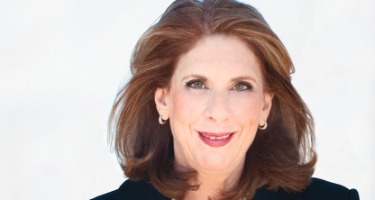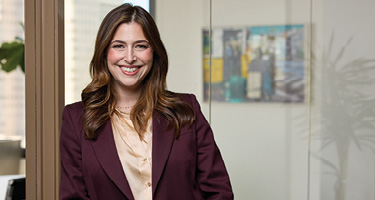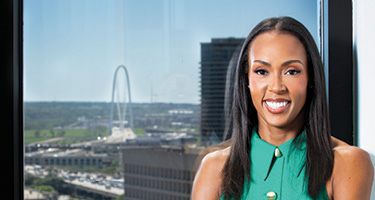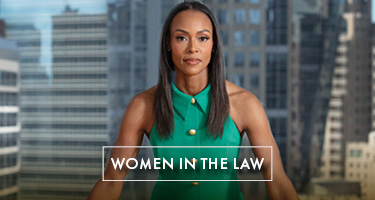Early in my career, a white male lawyer told me my naturally curly hair wasn’t going to cut it in law. There was something about it that had him convinced no one would take me seriously. A recent graduate of West Virginia University College of law, thrilled to have my first job, I was crushed.
The legal industry has come a long way from the days of policing the way women look and act. At Porter Wright, an AmLaw 200 firm with eight offices in the Midwest and Florida, we recently announced the first woman in firm history to be named chief operating partner, Deb Boiarsky. We also have more women than ever in our partnership and leadership ranks; six women were promoted to practice group chair or co-chair in the past six months. Our Women’s Leadership Initiative is active in working to help our women attorneys succeed in the business of law not only with internal programs and mentoring, but also in engaging and partnering with leaders outside the firm.
"From 2007 to 2017, the number of female lawyers in the U.S. increased by a mere 2.6 percent, according to the Vault/MCAA 2018 Diversity Report."
More than ever, firms see that working toward gender equity makes a difference in retaining quality talent and improving attorneys’ work satisfaction. A more diverse legal team brings a variety of ideas to the table, enabling firms to better innovate and work with clients to reach their goals. A 2018 survey of AmLaw 200 firms from the National Association of Women Lawyers showed that women make up 25 percent of firm leadership and 22 percent of managing partners.
Despite the progress that these numbers show, they’re not changing fast enough. From 2007 to 2017, the number of female lawyers in the U.S. increased by a mere 2.6 percent, according to the Vault/MCCA 2018 Diversity Report. That same report showed the number of women partners increased by only 4.8 percent. The number of partners who are women of color increased by a mere 1.5 percent. In addition, the Major, Lindsey and Africa 2019 Millennial Attorney Study showed 45 percent of women strongly agree that law firm culture is sexist.
This stunted growth may not be surprising to women lawyers reading this article, but it still feels extremely discouraging. This is all the more reason to continue efforts to advance gender equity. As someone who has spent my career in law and, specifically, in the male-dominated space of litigation, I’ve learned a few things about challenging the unconscious bias women in the legal industry encounter every day. Whether you’re at a firm or working in-house, there are questions you can pose to determine if your organization’s culture, policies, procedures, and practices are indeed gender-equitable. Take a close look at your firm or company—and if you find yourself underwhelmed by the answers to these questions, it may be time to take action.
Is Your Workplace Gender Equitable?
- Are your leaders, women and men, active advocates of gender diversity and gender equity?
- Is gender equity widely acknowledged as a company priority and core value?
- Are there proactive communications within your organization about gender equity?
- Has your organization succeeded in promoting women into leadership positions?
- Has your organization successfully retained experienced women?
- Has your organization set specific targets for achieving gender equity?
- Does your organization suffer from the “broken rung” (i.e., women getting stuck at entry level)?
- Does your organization conduct unconscious/implicit bias training?
- Are employees encouraged to flag bias when they see it?
- Are women given “office housework” more than men?
- Are women given the same complex assignments and opportunities to succeed?
- Are working mothers supported? How? Are there family-friendly policies in place?
- Does your organization suffer from “pinkwashing” (i.e., is it all talk, no action)?
- Is there a gender pay gap? Is there transparency on how to get to the next step?
- Are women included in informal gatherings—golf outings, drinks, client events?
If your answers to those questions felt discouraging, there are some concrete actions you can consider to start to make some significant change at your firm or company.
Bias Training:
Unconscious or implicit bias is the idea that people can be prejudiced toward a person or group of people without intending to be. Many organizations offer bias training to combat negative gender stereotypes. There are also some great online resources including Harvard’s Implicit Bias Test and the virtual-reality experience from Stanford University’s Virtual Human Interaction Lab, “1000 Cut Journey.” These can all help identify areas of self-awareness that can make a significant impact.
Expansion and Enhancement of Firm Programs and Policies:
I recommend that firms take a closer look at the policies and programs they offer to ensure they are fair and unbiased. Gender-neutral parental leave, diverse recruitment, and unbiased criteria for evaluation, promotion, and compensation should all be reviewed closely through a gender lens.
Accountability:
We know that many things can’t truly be measured in numbers, but it is important to gather data. Take a look at the information you can collect and look at the progression (or lack thereof) over time, including attrition, promotion, work assignments, compensation, and bonuses. Porter Wright joined the third cycle of the Mansfield Rule Certification Program, which aims to increase representation of not only women, but also lawyers of color, LBGTQ+ lawyers, and lawyers with disabilities, in firm leadership. A program like this forces you to start collecting data your firm may not have gathered before and begin looking at numbers in a way leadership might never have considered. Our firm is also a member of a consortium of five law firms in Columbus, Ohio, that work to tackle issues of gender equity in the legal industry. Seeing what your colleagues and competitors are doing can be great barometers of progress, as well as incentives to improve.
Affinity and Ally Groups:
Providing an opportunity for attorneys and staff with a shared characteristic or life experience to gather fosters a diverse and inclusive workplace. At Porter Wright, we are home to three of these groups: our Women’s Leadership Initiative, our Diverse Attorneys Network, and our Equality Alliance for attorneys and staff who are LGBTQ+ or allies. These are led by firm leaders and provide channels for the groups to network, develop business, create mentor/mentee relationships, and communicate their needs to senior management.
"It's important to continue to challenge the status quo, work to solve the issues that may be holding women back at your firm or company, and use your voice to advocate for those who may not realize yet that they have one."
Soliciting Feedback:
Consider collecting feedback on the firm’s culture through an anonymous survey, asking specific questions about gender equity in exit interviews, and creating a channel to levy anonymous complaints. Provide your attorneys and staff a safe space to be honest and help address these issues.
Because you must tackle gender equity from many different angles and progress can be slow, the problem can feel insurmountable. But this work is a marathon, not a 5K. It’s important to continue to challenge the status quo, work to solve the issues that may be holding women back at your firm or company, and use your voice to advocate for those who may not realize yet that they have one.
Years ago, I didn’t stand up for myself to that partner who told me to change my hair. His criticism went deeper than just my appearance; it was indicative of the age in which women in law were not the decision makers. They were the coffee getters, the copy makers, and the researchers. Today, I am a partner with a successful product-liability defense practice, and I chair our firm’s Women’s Leadership Initiative. I turned my passion and commitment—and sometimes frustration—into taking action for gender equity.
Now it’s your turn.
Joyce Edelman is a litigation partner at Porter Wright Morris & Arthur LLP in Columbus, Ohio. She has more than 30 years' experience representing clients in a variety of industries in high-exposure civil litigation. She chairs the life science subgroup of the firm's Product Liability Practice Group as well as the firm's Women's Leadership Initiative.































